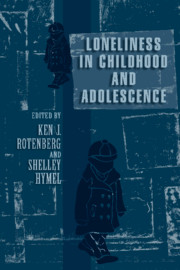Book contents
- Frontmatter
- Contents
- Contributors
- PART I INTRODUCTION
- PART II THEORETICAL AND ASSESSMENT ISSUES
- PART III LONELINESS IN CHILDHOOD
- 6 Loneliness During Early Childhood: The Role of Interpersonal Behaviors and Relationships
- 7 Connections Among Loneliness, the Ability to Be Alone, and Peer Relationships in Young Children
- 8 A Social-Information-Processing Approach to Children's Loneliness
- 9 Parental Antecedents of Children's Loneliness
- 10 Dimensions of Children's Friendship Adjustment: Implications for Understanding Loneliness
- PART IV LONELINESS IN ADOLESCENCE
- PART V PROSPECTIVE
- References
- Author Index
- Subject Index
- Plate section
6 - Loneliness During Early Childhood: The Role of Interpersonal Behaviors and Relationships
Published online by Cambridge University Press: 13 October 2009
- Frontmatter
- Contents
- Contributors
- PART I INTRODUCTION
- PART II THEORETICAL AND ASSESSMENT ISSUES
- PART III LONELINESS IN CHILDHOOD
- 6 Loneliness During Early Childhood: The Role of Interpersonal Behaviors and Relationships
- 7 Connections Among Loneliness, the Ability to Be Alone, and Peer Relationships in Young Children
- 8 A Social-Information-Processing Approach to Children's Loneliness
- 9 Parental Antecedents of Children's Loneliness
- 10 Dimensions of Children's Friendship Adjustment: Implications for Understanding Loneliness
- PART IV LONELINESS IN ADOLESCENCE
- PART V PROSPECTIVE
- References
- Author Index
- Subject Index
- Plate section
Summary
Decades ago, prominent theorists assumed that loneliness could only be experienced in adolescence and adulthood when needs for social intimacy, beyond those which parents could provide, were thought to begin (e.g., Sullivan, 1953; Weiss, 1973). This reasoning is reminiscent of psychoanalytic theorists who likewise believed that children could not experience depression (see Rutter, 1986). Similar to theory and research on depression, such thinking may have stultified empirical work on loneliness in young children because very few studies have been conducted on loneliness at this stage of development. Recently, however, researchers have recognized that, along with the need to be physically and emotionally close to significant others, young children are able to discern their social situation and emotional state. An initial estimate that about 10% of 5- to 7-year-old children feel very lonely or dissatisfied with their social relationships at school (Cassidy & Asher, 1992) supports the notion that young children can actually feel sadness about solitude. Furthermore, children in kindergarten and first grade comprehend the concept of loneliness, reporting that loneliness is “a feeling of being sad and alone” (Cassidy & Asher, 1992).
Given the incidence of loneliness in early childhood and the importance of this phenomenon, the researchers in our lab have studied loneliness among young children in the school environment. Our starting point for investigation was the fall of kindergarten, a time when children have just entered grade school and are making a transition to a new setting and social situation. Hymel, Tarulli, Hayden Thomson, and Terrell-Deutsch (this volume) have reported that feeling lonely often accompanies the occurrence of major life events, such as loss of a significant other or moving to an unfamiliar place.
- Type
- Chapter
- Information
- Loneliness in Childhood and Adolescence , pp. 109 - 134Publisher: Cambridge University PressPrint publication year: 1999
- 16
- Cited by



